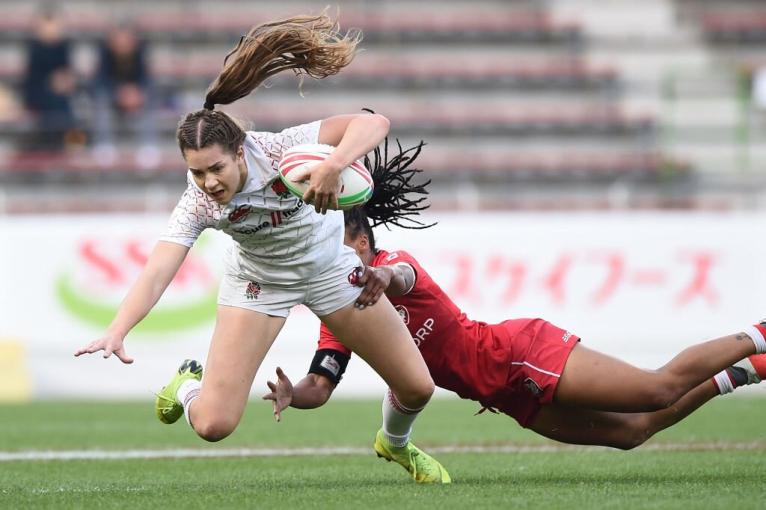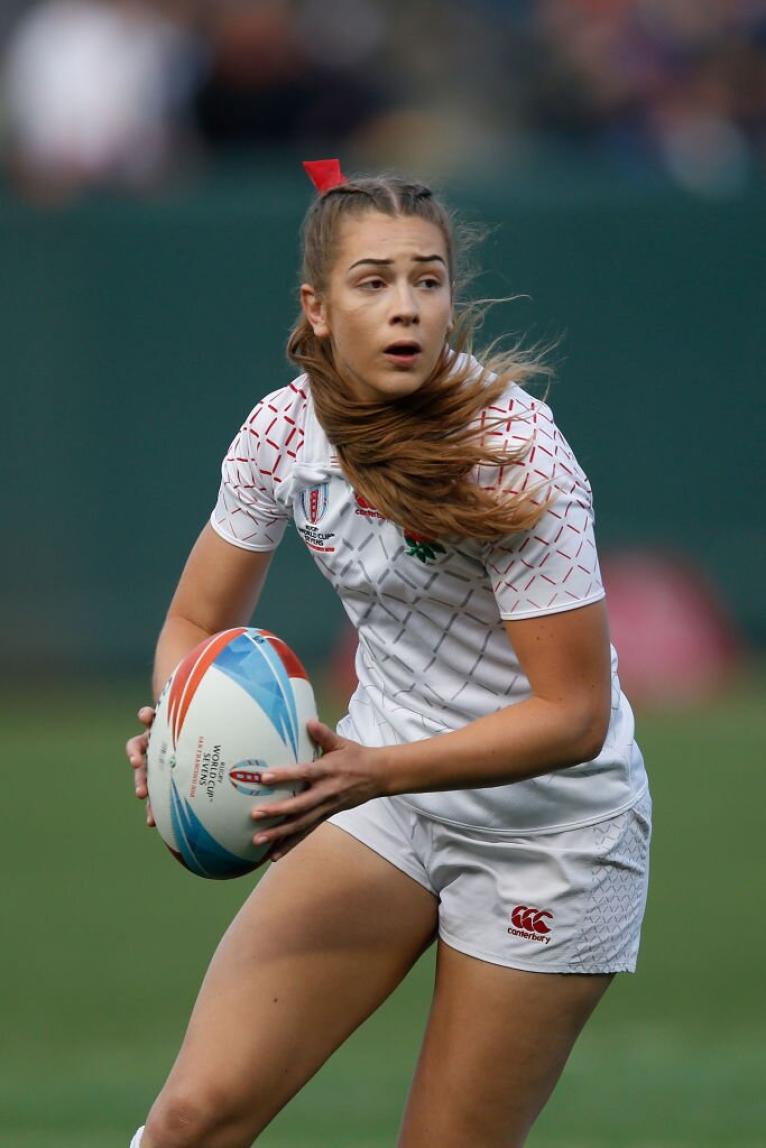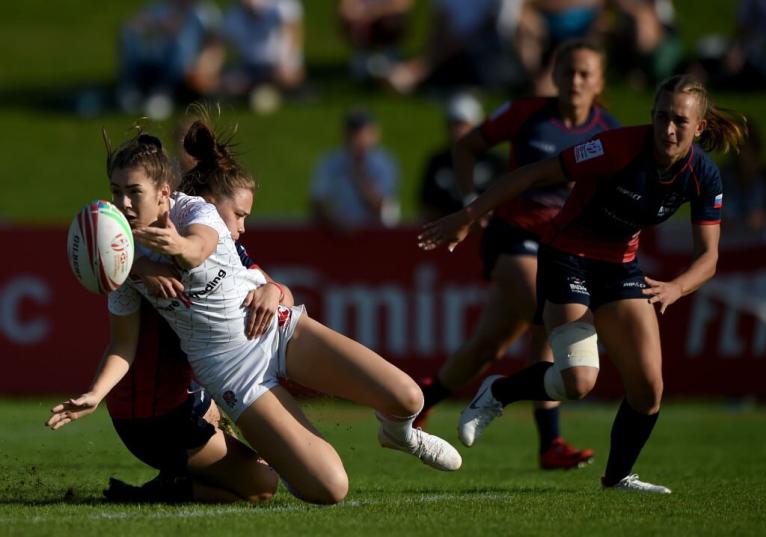'You cannot step foot on the rugby pitch because you're going to get broken'

From the seaside town of Formby and the Firwood Waterloo club in northern Liverpool, to far-flung locations such as Dubai and Sydney as a member of the England Sevens squad, the journey of Holly Aitchison has been one that has run parallel to the evolution of women’s rugby as a professional sport.
There were stops along the way at Hartpury College, where Aitchison attended one of the country’s most prestigious rugby schools, and Lichfield, with the fly-half making her first team debut for the West Midlands side whilst she was still at school.
Now, at 21 years of age, her accomplishments and achievements within the game are beginning to pile up, but it’s still a journey that is in its infancy.
A two-time U18 European sevens champion and a member of the squad that lifted the Challenge Trophy at the 2018 Rugby World Cup Sevens, Aitchison’s eye is now firmly fixed upon a goal that not many rugby players can dream of, and that is Olympic glory.
Since the sport’s reintroduction to the Olympics three years ago, interest in the seven-a-side format has multiplied, not only among fans, but also players who, like any athletically-gifted and competitive person, covet the glory, the experience and the special fraternity that only the Olympics can provide.
With England flying the flag for Great Britain’s prospects of fielding a team at Tokyo in 2020, the 2018/19 season has been a mixed bag for Aitchison and her teammates.
Finishing sixth on the HSBC World Rugby Women’s Sevens Series was not enough to secure automatic Olympic qualification, with only the top four guaranteed a spot in Tokyo, but there is more to the story than that.

“It’s definitely an improvement from where we were,” enthuses Aitchison.
“The last three years since I’ve been involved with the programme, it has almost been us laying a foundation for where we are going.
“I think it was difficult in the last couple [of Sevens Series’] with players leaving the programme and having a lot of new faces come in. There were so many changes over the past three years.
“Now we’ve got a solid base of players you can see, when we’ve got that time together, what we’re capable of.
“It’s really exciting. If you look at the start of the year, we were eight new caps and it almost helped us, being thrown in at the deep end, as it gave those new players that experience on the Series that maybe they wouldn’t have had in previous years.
“When you have a lot of experience moving back from XVs, you don’t get the opportunity to develop younger players with so much time on the Series, so I think that massively helped us, especially at the start of the year when we didn’t really know where we were [as a group].”
Those early struggles paid off in April, however, when Aitchison and England went to the final of the Series leg in Kitakyushu, the side’s first cup final in 16 tournaments.
They ultimately fell to a 7-5 defeat to Canada in that final, but it was a tournament that showed the potential of the group, as well as individually, with Aitchison and teammate Alex Matthews making the leg’s Dream Team.
“The season was definitely an improvement from years gone by, and I don’t think we were missing anything as such, but maybe we just didn’t have enough time to get going.
“We had a really tough Sydney, where we came 10th, and we were all aware that that’s not where we wanted to be and that it wasn’t good enough for the people we have in the squad.
“In Kitakyushu, we were pretty happy with the performances we put in. I’m smiling even just thinking about that tournament. It was the pinnacle [of the season] and showed how good we can be.
“Consistency is key and obviously we haven’t found that yet, but hopefully we’re on the up now and peaking at the right time!”
She slotted 13 from 13 conversions in Kitakyushu ?
What does #Canada7s have in store for @englandrugby ace Holly Aitchison? She's your @HSBC_Sport One to Watch #HSBC7s pic.twitter.com/hj1e1RhbHs
— HSBC SVNS (@SVNSSeries) May 10, 2019
Having failed to break into the established top four and powerhouses of women’s sevens rugby – New Zealand, USA, Canada and Australia – on the circuit this season, England and Aitchison will now look to the Olympic qualifying tournament in Kazan this July.
The winner of that European qualifier will book their place in Tokyo, whilst the teams finishing second and third will secure another shot at qualification through the Olympic Repechage, which is set to take place next year.
With France, Russia, Ireland and Spain all boasting strong squads this year, the competition in Kazan will be intense, but that is not discouraging Aitchison or her teammates, nor are they letting the pressure of the Olympics get to them.
“We’re not even thinking about the Repechage, to be honest. We’re confident.
“We’ve beaten these teams during the Series and although we didn’t have the consistency to start the season, if you look at the last two or three tournaments or even the invitational events where they’ve taken a fully-loaded squad, we’ve beaten the likes of Russia, France, Ireland and Spain across the year.
“We’re confident going into that tournament that we can replicate that again.
“It’s exciting that there’s a bit of pressure to perform and get to that Olympic stage and I think we’re definitely where we need to be right now to get there.”
Understandably, that lure of the Olympics is at the heart of Aitchison’s motivations, as it has been for plenty of other rugby players over the last few years, with the sport’s inclusion at the showpiece event having helped, somewhat, to redress the balance of XVs over sevens.
Like many of the female athletes coming through the pathway, that influenced Aitchison’s decision-making, as opposed to the men’s game, where XVs continues to dominate so comprehensively.
“Coming out of school, that’s [sevens] where the contracts were. Obviously, it’s great now that the XVs have had their investment and they’ve got the commitment to them now where they can be professional athletes, but ultimately for me it was the Olympic dream.
“That’s something I was hooked on and it’s something I’ve wanted to do since I was a little kid. To even get the opportunity to try and get to that stage was a chance I couldn’t miss.
“There’s an U18 sevens side and I did that with the European championships, but there wasn’t an U20s level or a feeder into it [the senior 7s side], so once you finished in the U18s, there was nothing post that. You were just in or you were out.
“I wasn’t thinking I was definitely a sevens player; I sort of just fell into it.
“It was at a time when they’d just come off the back of Rio and there was a lot of chopping and changing and some players went back to XVs. I was just lucky that the opportunity came up and there were people who wanted to have a look at me.”

Sometimes, careers are moulded and decided on small moments and that’s potentially the case with Aitchison, when she was coming through that aforementioned pathway.
She had been part of the England U20 XVs side and had impressed early in 2016, before injury ruled her out of a three-match series with Canada, a series which helped propel the likes of Sarah Bern, Jess Breach and Zoe Harrison to senior England representation.
Had the injury not occurred, would Aitchison’s career have taken a different path?
“We’ll never know, and I tend to lean towards the thought that what was supposed to happen, happened. I’d like to hope that I would have progressed and made it in XVs, but equally I’m so happy that it happened that way and that I’m where I am now.
“At the moment, my sole focus is sevens and that’s been my drive over the last three years. Post-Olympics – and fingers crossed I have a long career – I do have aspirations to go back to XVs at some point.
“I don’t know if the opportunity will come up but if it did, it’s definitely something I’d think about.”
Aitchison doesn’t lack for experience in XVs, either, having played the longer format growing up, something which shouldn’t come as a surprise given that her father is Ian Aitchison, a former Director of Rugby at Waterloo.
As well as that formative experience in XVs at home and at Hartpury, the 21-year-old also turned out for Lichfield whilst she was still in the final year of her schooling.
“I was at the sevens for my 18th birthday and then went into Lichfield – I think they had an injury – and someone said, “give her a run, see how she goes” and I got onto the bench.
“I was so nervous. I’ve never been so nervous for a game in all my life!
“I luckily got 10 minutes at the end and I was so happy just to get on the pitch against Sarries. It’s a weird thing at Lichfield, people always score on their debuts and when I went over the line it was mad, I was like “what have I just done?””
That time at Lichfield helped Aitchison make the transition from underage rugby to the senior game, although that didn’t mean that there still wasn’t plenty to learn when she stepped into the England Sevens programme in 2016.
It certainly wasn’t as seamless as these transitions can look from the outside.
“It’s a massive step between the U18s and the senior game. It was the professionalism of the programme and improving myself as an athlete, as well as a rugby player.
“I played rugby since I was young, so I had the rugby skills, but I didn’t have the athleticism. I needed a lot of work, as in my body needed a lot of work, before I was going to be physically robust enough to compete on the Series.
“It was definitely a case of me being a little fish in the big pond again, as you come into a programme with people who have been to the Olympics.
“I’d been to Hartpury with Abbie [Brown] and I’d watched her at the Olympic Games, and suddenly I’m in a programme with her again.
“It was like “how can I replicate what she did” almost, because I was looking at Abbie as a role model. She’d done all these things and she was quite similar to me, in that she had the rugby skill to start with [but needed to do the physical work].
“They basically took me out of rugby at the start, which is what they did with her, and I wasn’t allowed to touch a ball for eight weeks!
“They said “you cannot step foot on the rugby pitch because you’re going to get broken” and they were so worried about me getting injured. I just had to slog it out for eight weeks, where I basically did running and gym every single day, to get myself to where I needed to be.”
MASTERCLASS ?
Back from Japan having hit 10 from 10 at the #Kitakyushu7s ?
Here's @hollyaitchison_'s guide to drop kicking… pic.twitter.com/df5a75YFfE
— England Rugby (@EnglandRugby) April 23, 2019
Brown’s position as a role model for Aitchison certainly helped her in her transition to the senior set-up, although she is far from the only major influence in the fly-half’s young career.
“My father was massive. From a young age, I always knew I was going to be in and around rugby and I used to go down to Waterloo and just sit on the side of the pitch.
“I started at about five and he was my first proper coach and role model until about 12.
“He’s still a massive influence but as I was coming away from the boys and going into women’s rugby, people at Hartpury were then significant.
“[Danielle] Nolli Waterman ran the programme the year before I got there and she’d been singing Hartpury’s praises.
“She said Hartpury was almost halfway there, as it was essentially a professional programme and that you would do almost everything a professional athlete would do, alongside your education.
“Obviously, Emily Scarratt, too, when I went to Lichfield. That was crazy.
“I walked into the changing room in my first game, when she was contracted with the sevens, and I was in her shirt – 13 – and I was like “oh God, she’s sat in the changing rooms right next to me!”
“She was calm as you like and such a humble person. Someone like her, such a genuinely nice person and an exceptional rugby player, was definitely someone I looked up to.
“Then coming into the sevens, being around her again and seeing how professional she is, she’s pretty much the ultimate, in terms of someone you aspire to be.”
Waterman and Scarratt have already left their legacies in rugby, with both having been part of the victorious England side at the 2014 Women’s Rugby World Cup, as well as picking up the runners-up spot at the 2017 tournament.
Aitchison is enthusiastic about the direction that the sport is heading in, something which will hopefully allow her to create her own legacy that the next generation of up and coming youngsters can then be inspired by.
“We’ve gained Hong Kong, Cape Town and Hamilton on the circuit [for next season], so they are making improvements. It would be amazing to have a home leg.
“It would be so important for us, especially with the Commonwealth Games in Birmingham in 2022, to have played on home soil.
“I don’t know what the organisers are thinking but the likes of Canada, USA, New Zealand and Australia, the teams at the top of the game at the moment, all have home legs.
“Whether that directly impacts their performance is a different story, but to feel the support of everyone and to have that connection is something we would love to have. We are definitely pushing for that.
“I really like it when we’re twinned [with the Men’s Series].
“I think it’s cool that we can share facilities and that you can go into the food hall and you’re sat with the guys.
“Just because they’re men doesn’t mean you don’t look up to them and they’re people you’ve watched on TV and admired.
“It’s the same when you come to The Lensbury [England Sevens training base] and they’re sat at dinner. I really enjoy having the boys around, I think it’s a good thing to have.
“It would be good to twin with the men at every given opportunity.
“The crowds they attract are very different to what we get, so a crowd in Hong Kong is hard to compare to one in Kitakyushu. Not that it’s massively important in terms of performance, but just the feel of it is so different.”

The prospect of a combined or independent women’s side for the British and Irish Lions, with the Lions’ managing director Ben Calveley recently stating that it’s a case of “when, not if” a women’s side is introduced, is something Aitchison believes could help take the women’s game to the next level.
“It would be a similar situation to the sevens. If you could twin the events, what more could you want?”
“If you’re supporting the men’s side and the women have the same team, why wouldn’t you support both?
“You would then get the dual interest from fans and that would be important to help spark the media interest. Whether it’ll happen, I don’t know!”
As with any professional sport, however, the difference between success and failure so often comes down to finance.
“The media coverage is important but ultimately what we need in order to move forward is investment.
“If you look at it from a business perspective, you have to invest before you get any potential returns.
“If you look at AFL Women’s, they put a load of money in two years ago. There wasn’t much interest in the first year, but after year one and them selling the TV rights, the interest grew massively, and they’ve made money from selling the licensing.
“If that could be mirrored by us, that’s definitely something that would give us a bigger platform, as well as a bigger media base.
“If you look at the main teams doing well here, the Saracens and the Harlequins of the world, they are doing well because they’re investing in the women’s game, and it’s similar to what France are doing with their women’s club game.”
With the increasing participation numbers and the general growth of women’s rugby outstripping most sports globally, let alone just in the UK, it’s hard to argue with Aitchison’s point.
Attendance figures are seemingly annually broken, more broadcast deals are being struck and the level of coaching that girls have access to is ensuring that a higher calibre of player than ever before is being produced.
The time to speculate in women’s rugby, it would appear, is certainly here.
Aitchison will need to put aside what seems like a promising career in rugby administration for now, however, as she and her teammates gear up for the European Grand Prix in France this weekend, their final hit out before heading to Kazan for the Olympic qualifier.
If the group can reach the levels they did in Kitakyushu earlier this year, their Olympic dreams will be one step closer to reality in Russia next month.
Watch: Saracens Women – ‘Going Pro’



















